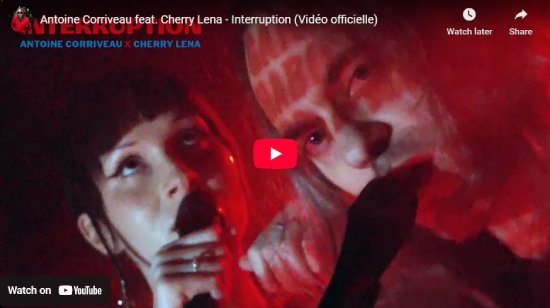Antoine Corriveau possesses an incandescent tenacity, a relentless drive to never take the same path twice. On Oiseau de nuit, he returns with a chiaroscuro piece created in a studio where he allowed chaos ran free, later re-organizing its fragments into a more coherent whole. It’s album made of granular textures, interrupted silences, and inner voices that intersect without trying to dominate one another. The LP avoids being linear the same way that creatures of the night avoid daylight.
 “I think, for the longest time, I’ve seen duality as an imperative,” says Corriveau. “But now, I think it’s no longer duality that inhabits me, but multiplicity. There aren’t just two of me, there are twenty-five.” This desire to embrace fragmentation over cohesion permeates the entire album, starting with the method used to create it: an accumulation of raw material and improvisations from trusted musicians, which Corriveau then twisted, chopped, and re-assembled, until a strange, vibrant and undeniably “his” music started to emerge.
“I think, for the longest time, I’ve seen duality as an imperative,” says Corriveau. “But now, I think it’s no longer duality that inhabits me, but multiplicity. There aren’t just two of me, there are twenty-five.” This desire to embrace fragmentation over cohesion permeates the entire album, starting with the method used to create it: an accumulation of raw material and improvisations from trusted musicians, which Corriveau then twisted, chopped, and re-assembled, until a strange, vibrant and undeniably “his” music started to emerge.
The starting point for Oiseau de nuit was an LP made of samples, itself rooted in a desire to mine a mountain of vinyl records. “I quickly realized I felt restrained,” says Corriveau. “I’m no beat-maker. I had this old turntable plugged into a crappy amp. I tried stuff, but I would need, like, four hours to create a groove.” That’s how ended up creating his own raw materials, and invited a collection of musicians from a very diverse set of backgrounds to improvise without any instructions, restrictions, or safety net.
Some household names pepper the adventure, like Stéphane Bergeron on drums and co-production; Marc-André Landry on bass; Simon Angell on guitar and sax; and François Lafontaine, Sheenah Ko, Pietro Amato, Cherry Lena, VioleTT Pi, and Rose Perron. But there are also some unexpected names, such as jazz pianist Taurey Butler, or harpist Éveline Grégoire-Rousseau. “I didn’t want musicians who play on everyone’s albums,” says Corriveau. “I wanted people who’d take me to new places, even if I had no idea where that was going to be.”
As the weeks of recording went by, the material kept accumulating. Corriveau sorted, stitched, and de-constructed. He also improvised without knowing what he was looking for. “I’ll play whatever for 30 minutes, and then listen to it. Half of it is crap, but sometimes there’s a gem in there,” he says This instinctive approach, which he calls “re-organized vomit,” became the album’s backbone.
However, Oiseau de nuit is also a screen production: A short film accompanies “Pastorale,” one of the songs. The movie was directed by Francis Leclerc, and features Corriveau, whose spaceship drifts through the void, as he converses with voices that could just as easily be artificial intelligences as they could be… memories.
“Francis said, ‘You’re going to write the dialogue.’ I’d never done that before. I wrote a scene for each song on the album, and I had no clue if it made any sense.” The result is both absurd and deep, mysterious yet familiar. The cast, which was kept secret for the “wink, wink” effect, is the same as the 1995 film Eldorado. That wink ended up becoming something more meaningful. “I constructed those voices. That’s me talking and that wink is precisely because I loved Eldorado,” he giggles.

Select the image to access the YouTube video of the Antoine Corriveau song “Eruption” (featuring Cherry Lena)
Lyrically, Oiseau de nuit is very wordy. The author speaks faster, longer, and with a newfound density. “Someone told me that they felt that with each new album, I cram more and more words inside a single minute. Well, it’s true,” he says. Inspired by the likes of Kendrick Lamar and Armand Hammer, he pushes his lyrics to their rhythmic breaking point. Each syllable is carefully weighed, placed, and hammered. “I had a lot of fun doing that, and I mean locking in the sentence with the drums,” he says.
Could it be that all those clashing words and characters only exist to act as a giant shield, one that hides the artist’s true sentiments, actual details, intimate stories? “Maybe,” he admits. “I’d never thought of it that way, but it makes sense. I think, on certain tracks, like ‘Moscow Mule,’ those details are there for colour. They might not drive the narrative, but they set the scene, creating an atmosphere.”
In the end, there’s something deeply humble and lucid in his way of telling his story, doubting himself and crafting his songs. He doesn’t claim to be re-inventing the wheel, but makes sure he doesn’t walk the same road twice. The more songs Corriveau writes, the less he does anything he’s done before, and the further away he gets from any form of convention. “I don’t want to make the same thing over and over.,” he says “And it’s not just about the end result – it’s for my own sake, so I don’t fade away by doing that.”
This album might seem unapproachable at first glance, but it’s actually incredibly hospitable, and extends an open hand to anybody unafraid of getting a bit lost. It soulful, generous, all over the map, but above all, alive. That’s very much in the image of its creator, who’s still searching, at every turn, to make sounds say what words alone can’t.
Corriveau sets the bar very high, then jumps right over it. It’s the only way he knows to avoid getting bored with making music. “OK, I guess some would call that candour and others stupidity, but I just like trying new things and surprising myself,” he says.
Rest assured, many of us feel that same frisson.